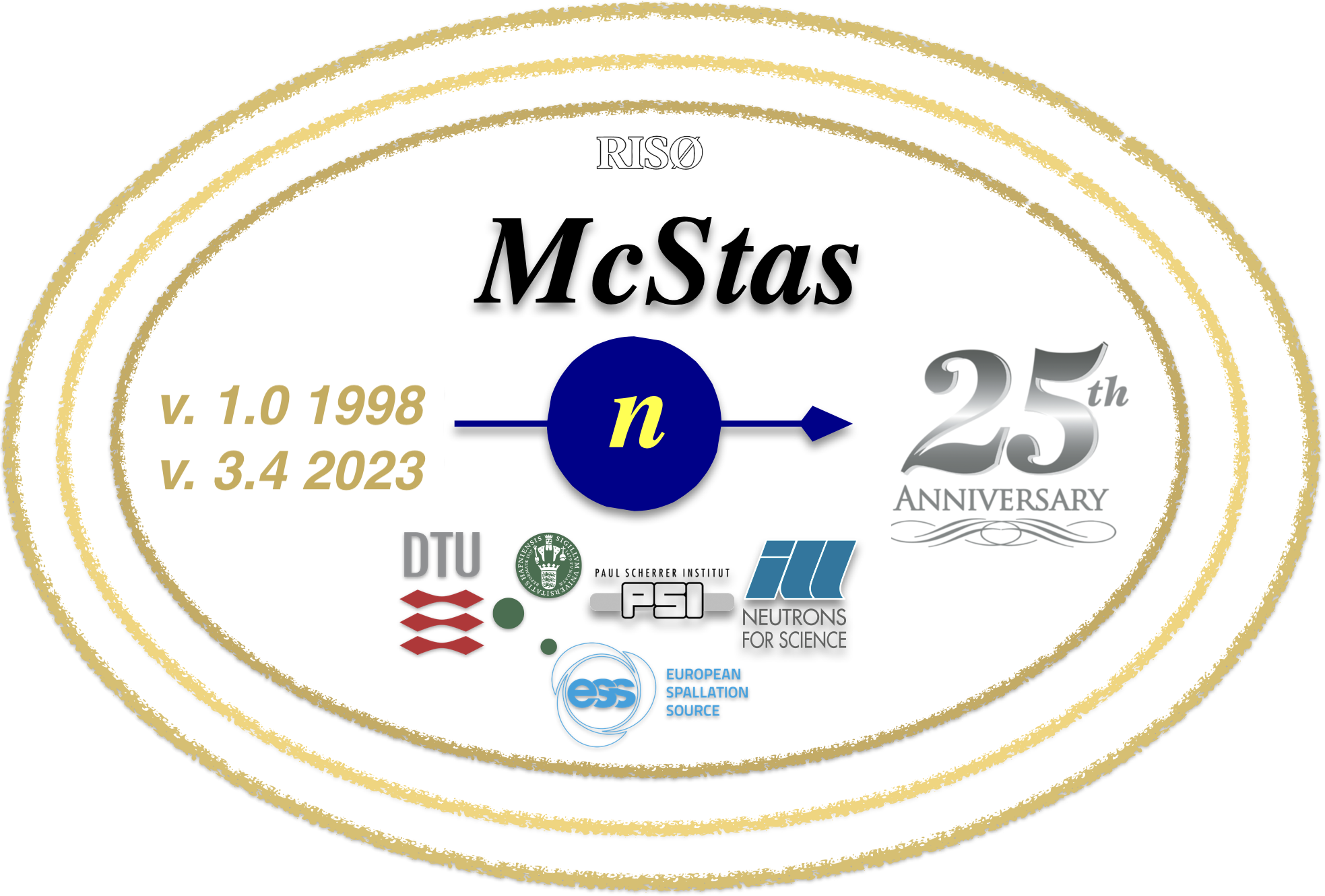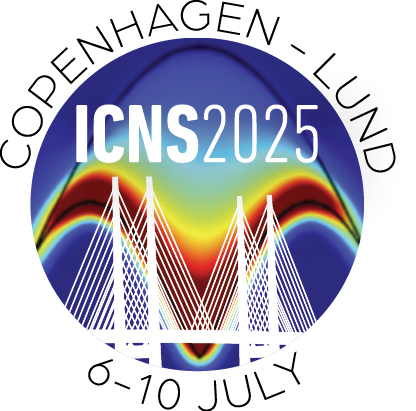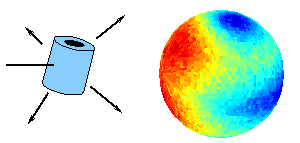







About McStas
Conditions of use
Authors/Contacts
Project funding
Download
Components
Other Downloads (share)
Documentation
Wiki (GitHub)
McStas manual
Publications
McStas - A neutron ray-trace simulation package
|
| The plot shows the intensity of scattered neutrons (red is
highest intensity). The sample is at the center of the sphere with the
neutron beam coming from the left. Clearly seen is the shadowing effect
of the sample causing a lower intensity opposite the beam. Also seen is
the effect of the non-symmetric geometry of the sample, causing lower intensity
directly above and to the side of the sample. |  |
Recent news
Migrating from McStas 2.x to 3.x? - Use the wiki-based guides
February 19th, 2025: McStas and McXtrace 3.5.24 released
Dear all,
McStas and McXtrace release 3.5.24 is now available - McStas installation
instructons on GitHub .
What's Changed
Important note
- McStas and McXtrace will soon change organisation-name on GitHub - from McStasMcXtrace -> mccode-dev
User interfaces and tools
- [Feature]
mcgui/mxguiLet configuration dialogue spawn yourEDITORto edit your localmccode_config.jsonby @willend in https://github.com/mccode-dev/McCode/pull/1838 (available also by--edit-user-configfrommcrun/mxrun) - [Feature]
mcrun/mxrun: New switch --cogen to allow on-demand switch to non-standard code generator. See also interoperability withmccode-antlrbelow by @willend in https://github.com/mccode-dev/McCode/pull/1851 - [Feature]
mcrun/mxrunSolution for picking up code generator from PATH if not found where expected by @willend in https://github.com/mccode-dev/McCode/pull/1840 - [Feature] pygen minor revision: Build importable make() function and call from generic notebook by @willend in https://github.com/mccode-dev/McCode/pull/1827
- [Fix] Support Scintilla editor on Debian with Qt6 by @willend in https://github.com/mccode-dev/McCode/pull/1813
- [Fix] Drop hard-coded check for PyQt5 by @willend in https://github.com/mccode-dev/McCode/pull/1814
- [Fix] No more hidden Perl dependencies! (perl -> python 1-liner readlinkf()) by @willend in https://github.com/mccode-dev/McCode/pull/1824
- [Fix] too-restrictive
mcdisplay/mxdisplayinstrument line parsing by @g5t in https://github.com/mccode-dev/McCode/pull/1834 - [Fix] Patches for
mcdisplay/mxdisplayin Windows from @LelandWH https://github.com/mccode-dev/McCode/issues/1853
Components and instruments
- [Fix] McStas
Vertical_bender: Add max iteration criterion for while loop (default 1000). by @willend in https://github.com/mccode-dev/McCode/pull/1815 - [Fix] McStas
NCrystal_sample: Remove possible out-of-bounds memory access by @g5t in https://github.com/mccode-dev/McCode/pull/1821 - [Fix] McStas
Elliptic_guide_gravityandPol_mirror: Minor comp revisions, suppresses compilation warnings from clang by @willend in https://github.com/mccode-dev/McCode/pull/1826 - [Fix] McStas
SNS_ARCS.instredits by @willend in https://github.com/mccode-dev/McCode/pull/1838 - [Fix] McStas
ISIS_IMAT.instrDEPENDENCY " @NEXUSFLAGS@ " added by @willend in https://github.com/mccode-dev/McCode/pull/1839 - [Fix] McStas
Union_masterAdjustment of default parameter by @willend in https://github.com/mccode-dev/McCode/pull/1840 - [Fix] McStas
Union-related fixes and imports from DMSC school by @willend in https://github.com/mccode-dev/McCode/pull/1841 - [Fix] McStas
Elliptical_guide_gravitydid not work in GROUPS as it always SCATTERS by @mads-bertelsen in https://github.com/mccode-dev/McCode/pull/1843 - [Fix]
Monitor_nDon GPU: Adjustments for coherence between CPU and GPU particle lists by @willend in https://github.com/mccode-dev/McCode/pull/1816
Core simulation toolkit
- [Feature] NeXus: sort comp instances by index and include comp parameter information by @willend in https://github.com/mccode-dev/McCode/pull/1828
- [Fix] Increased stability in NeXus x wide MPI by @willend in https://github.com/mccode-dev/McCode/pull/1811
- [Fix] Portability, Windows +
cl.exe: Remove variable length array allocations for issue #1817 by @g5t in https://github.com/mccode-dev/McCode/pull/1819 and https://github.com/mccode-dev/McCode/issues/1818 by @willend in https://github.com/mccode-dev/McCode/pull/1822
Interfaces and interoperability with other codes
NCrystal
- Thanks to @tkittel for ping-pong on this :)
- [Feature] McStas 3.5.24 and later now depends on NCrystal 4.0.0 and later. NCrystal is now available also on Windows! by @willend in https://github.com/mccode-dev/McCode/pull/1848 and https://github.com/mccode-dev/McCode/pull/1855
mccode-antlr
- Thanks to @g5t for ping-pong on this :)
- [Feature]
mccode-antlris an alternative code-generator for McStas and McXtrace - a new development by @g5t and based onANTLRinstead oflex/yacc. The new tool is mainly written in python and thus has a lower barrier for changes in language syntax and code generation. The tool implementationsmcstas-antlrandmcxtrace-antlrare thus a candidate implementations to potentially replace the classicmcstasandmcxtracecode generators in the future. Current status is that- McStas:
mcstas-antlris fully feature complete wrt.mcstasfor CPU simulations and close to complete for GPU simulations - McXtrace: Not all instruments will compile using
mcxtrace-antlrbut basic functionality is in place - To try:
- Install
mccode-antlrfromconda-forgeor viapip - Adapt your configuration to use e.g.
mcstas-antlrby- Setting the new
--cogen=mcstas-antlroption inmcrun - Enable or edit the
MCCOGENfield ofmccode_config.jsonusing the newSave/Edit configurationinmcgui - (The antlr tools default to download comps etc. to an internal cache: Add e.g.
-I${MCSTAS}to prefer ingredients fromyour local library)
- Setting the new
- Use the
mcrun-antlr/mxrun-antlrtools provided directly bymccode-antlr
- Install
- McStas:
Platform support
- Debian/Ubuntu
- [Fix] Make hidden numpy dependency explicit also on Debian by @willend in https://github.com/mccode-dev/McCode/pull/1825
- [Fix] McXtrace meta-pkgs for Debian add libgsl-dev as dependency by @farhi in https://github.com/mccode-dev/McCode/pull/185
- Windows
- [Feature] NCrystal is now available with McStas on Windows
- [Info] Windows via cross-compiled
.exeinstaller frommccode.org: Please place the MCPL-related.batfiles from theextrasfolder in e.g.c:\mcstas-3.5.24\binto enable MCPL (May require giving your user 'full access' permissions to the bin folder) - [Info] Windows via conda-forge: MCPL is not yet available but expected during the spring
Full Changelog: https://github.com/mccode-dev/McCode/compare/v3.5.16...v3.5.24
January 8th, 2025: Monte Carlo Satellite to ICNS2025
Dear all,
The ICNS2025 conference is taking place in Copenhagen and Lund this summer, and the abstract submission is closing January 15th - in one week.

Of special interest to McStas users:
A satellite event is being planned for July 11th, arranged by Mads Bertelsen, ESS and Peter Willendrup DTU/ESS.
We envision a one-day event with contributed talks on instrument simulation and its use, abstract submission will open soon:
Advanced computer simulations methods for neutron scattering instruments
Abstract:
Neutron scattering relies heavily on computer simulations of neutron scattering instrumentation to optimize their performance. These simulation tools are also evolving to be more relevant for a running facility, aiding in both preparation and analysis for individual experiments. It is even becoming possible to make better decisions during experiments by running simulations in parallel.
All the best and hope to see you this summer in Copenhagen,
Peter Willendrup
Previous news items: 2024, 2023, 2022, 2021,2020,2019, 2018, 2017, 2016, 2015, 2014, 2013, 2012, 2011, 2010, 2009, 2008, 2007, 2006, 2005, 2004, 2003, 2002, 2001, 2000, 1999, 1998.

 Simulated
scattering from a hollow-cylinder
Simulated
scattering from a hollow-cylinder